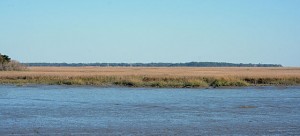If you’ve been following the news out of Florida lately, you are aware that they have been experiencing the impacts of “red tides”, which have killed millions of fish, mammals, and reptiles like sea turtles this summer. A “red tide” is a harmful growth of algae in the sea water which depletes the oxygen and suffocates life. Red tides are caused by a number of factors, including warm ocean water, calm conditions, and enhanced nutrient levels, which act as fertilizers to the algae. This year’s red tides are particularly bad and have been linked to a lot of runoff that has brought heavy nutrient loads to coastal waters. Fortunately, it has not been as big a problem in Georgia in the past as in Florida, but that could change in the future if we have more runoff bringing excess nutrients to coastal ecosystems. Today’s Roadmap question from the Georgia Climate Project discusses how changes to the streams that feed into coastal estuaries could affect their health.
15. How will climate-related changes in upstream water systems influence coastal ecosystems?
Why this question is important: Dynamic coastal ecosystems are strongly influenced by the adequate quantity and quality of upstream freshwater surface flow and groundwater. Projections indicate that many of the world’s watersheds will experience dramatic changes in river discharge resulting from changes in drought, precipitation, and temperatures, and many will experience water stress (Palmer et al. 2008; Syvitski et al. 2005). These changes in riverine flow can impact the coast’s productivity in response to a change in the timing and amount of freshwater, nutrients, and sediment delivery (Alber 2002; Syvitski et al. 2005; Camargo and Alonso 2006). Higher water temperatures and changes in freshwater delivery will alter estuarine stratification, residence time, and eutrophication (Scavia et al. 2002). The effects of climate change on water systems and community water needs are unknown but expected to be problematic (Palmer et al. 2008) and also exacerbated by other ecosystem stresses (Scavia et al. 2002). The land adjacent to the coasts of Georgia is primarily agricultural, so coastal conditions will be influenced by agricultural practices and terrestrial adaptations to climate change in the agriculture sector.
